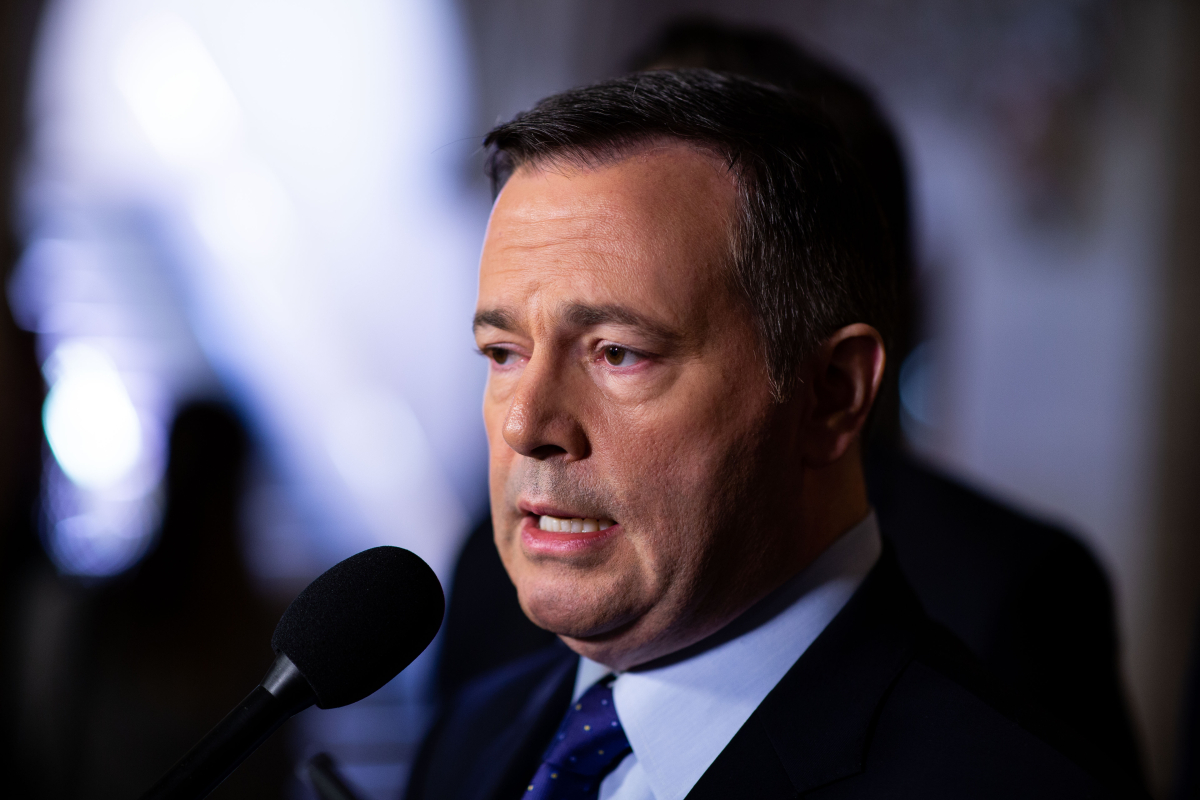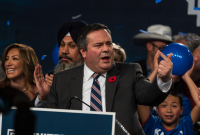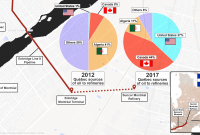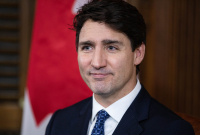Thank you for helping us meet our fundraising goal!
On December 16, at a rally in Grande Prairie, Alberta, politicians from both sides of Alberta’s political divide waxed poetic about the need to protect the province’s oil and gas industry.
Alberta Minister of Economic Development and Trade Deron Bilous, and Jason Kenney, leader of the opposition United Conservative Party, both spoke at the rally. “There is not a road, a bridge, a school, a hospital that doesn’t owe something to the Alberta energy sector and we need the prime minister to wake up to that,” said Bilous. “This is not just the fight of our lives, for our prosperity, for our schools and hospitals and way of life,” said Kenney.
The convergence of both parties’ rhetoric poses a problem for the opposition United Conservative Party (UCP). With an election just six months away, Kenney must find a way to differentiate himself from the governing New Democratic Party (NDP) on oil and gas, a difficult task when the rhetoric is so similar.
Enter Quebec, an easy target for Alberta politicians, especially right-wing politicians playing to a base that doesn’t hide its Francophobia. Quebec offers the UCP something that the Alberta NDP doesn’t: an opponent that is somewhat against oil development, and that is linguistically, culturally and physically distant.
Quebec bashing is low-hanging fruit for Kenney. Quebecers and the French language are frequently disparaged online by right-wing pundits and activists. Calgary Mayor Naheed Nenshi was booed at a Calgary oil and gas rally when he announced that organizers had asked him to speak French – a gesture intended to reach Quebecers and local French-language media directly.
At the Grande Prairie rally, Kenney took a shot at Quebec by promising to “trigger binding constitutional negotiations” to stop equalization payments, money that redistributes tax income from provinces that have higher-performing economies, like Alberta, to provinces that have lower-performing economies, like Quebec.
Quebec bashing may intensify
Equalization is the money that binds Canada’s federation together. The payment calculation is complicated, making it a favoured football that politicians angry with Ottawa like to kick around. On this issue, Kenney has a kindred spirit in Quebec’s new premier, François Legault, who, before elected premier, promised to get Quebec off of the equalization scheme. Kenney was quick to welcome the news on Twitter.
But, equalization is only one side of Kenney’s anti-Quebec strategy. The other is using Quebec’s general opposition to pipelines. A week before the Grande Prairie rally, Legault responded to questions about the cancelled Energy East pipeline project by saying that there’s no social license in Quebec for pipelines, and that Quebecers reject “dirty oil,” meaning oil extracted from Alberta’s oilsands.
Alberta premier Rachel Notley responded to Legault with scorn: “I would say to the Premier of Quebec that he just needs to get off his high horse, he needs to look [at] what’s in the ground and he needs to understand that not only is our product not dirty, but it actually funds the schools, the hospitals, the roads and potentially even some of the hydroelectricity infrastructure in Quebec.”
On Twitter, Kenney claimed that Legault was using a “veto” given to him by Prime Minister Justin Trudeau to cancel the project, which is entirely false. In a New Year interview with Global National News, Kenney laid out his path to victory in how he chose to respond to questions: not by attacking Notley too much, but instead to scapegoat Trudeau and Legault, while exploiting economic fears among Albertans.
TransCanada abandoned the Energy East pipeline project in October 2017. The pipeline could have delivered 1.1 million barrels of oil per day to New Brunswick for refining and shipping from Canada.
Legault and Kenney should be allies. They have a similar political orientation. Legault has been highly criticized for his government’s environmental policies, or lack thereof. One of his first decisions as premier was to cancel the Apuiat wind farm project, which would have brought hundreds of jobs to the Innu community of Essipit on Quebec’s north shore. He has made no promises to move Quebec off oil, or to stop oil and gas exploration in Quebec.
Unlike Kenney however, Legault is a true populist. His political compass skews right, until it breaks with the majority opinion of Quebecers. In Quebec, the forests, the winters and the St. Lawrence River are as much a part of Quebec identity as the language. It’s not too surprising that Quebecers have been vocally opposed to pipelines, as they need to either pass through the province from Western Canada to refineries in New Brunswick, or be shipped along rail or by boat.
Notley and Kenney are solidly opposed to each other’s approaches on pretty much every social policy, but oil and gas will be the most important political issue of the election. As the election draws closer, Kenney is finding his sweet spot. Using Legault as a foil is smart politics, and the attacks will ramp up as the election draws closer. If he’s elected, you can bet the relationship between the two men will warm somewhat, but until then, anticipate the Quebec bashing to get more intense.






Comments
I am a Franco-Columbian by choice and a Franco-Ontarian by birth. I too have disliked the nationalist streak in Quebec which at the height of separatist sentiment essentially abandoned French-Canadians elsewhere in the country. I also despised the equalization payments that are skewed to Quebec's advantage. However, it may be effective politics to bash Quebec on oil and gas but it IS NOT SMART politics. Any politics that promotes hatred on the basis of background or boundaries is leaning towards jingoistic and racist policies. It may win elections but causes much worse inter-provincial relations in this case. Smart governance trumps smart election victories every time - and yes the use of that verb was carefully chosen. Smart politics are those policies and approaches that bring people together and discuss things rationally. Of course that is difficult but naming it "smart" is wrong for both politicians and journalists. Finally oil and gas are relatively recent additions to the human means for transportation and other uses. We can and will survive their abandonment for better alternatives. A business model that allows a company to rely on deferrals, very low taxes, exorbitant profits and free access to land which they then can abandon leaving behind environmental problems that can last for decades is a very faulty business model indeed. No bank would back such a venture if it weren't for government largesse. No other type of business gets these types of advantages except other resource extraction businesses. Do we see a pattern here? Can we reign in this approach and get really smart?
I am a Franco-Columbian by choice and a Franco-Ontarian by birth. I too have disliked the nationalist streak in Quebec which at the height of separatist sentiment essentially abandoned French-Canadians elsewhere in the country. I also despised the equalization payments that are skewed to Quebec's advantage. However, it may be effective politics to bash Quebec on oil and gas but it IS NOT SMART politics. Any politics that promotes hatred on the basis of background or boundaries is leaning towards jingoistic and racist policies. It may win elections but causes much worse inter-provincial relations in this case. Smart governance trumps smart election victories every time - and yes the use of that verb was carefully chosen. Smart politics are those policies and approaches that bring people together and discuss things rationally. Of course that is difficult but naming attacks "smart" is wrong for both politicians and journalists. Finally oil and gas are relatively recent additions to the human means for transportation and other uses. We can and will survive their abandonment for better alternatives. A business model that allows a company to rely on deferrals, very low taxes, exorbitant profits and free access to land which they then can abandon leaving behind environmental problems that can last for decades is a very faulty business model indeed. No bank would back such a venture if it weren't for government largesse. No other type of business gets these types of advantages except other resource extraction businesses. Do we see a pattern here? Can we reign in this approach and get really smart?
Politicians who rely on the passion of targeting perceived "enemies" as their electoral strategy only reveal how desperately impoverished their governing ambitions are. PC's across this country and their regressive brethern world wide have universally retreated from addressing in pro-active terms the irreversible truths of climate disruption, and the painful gains in social justice. They have fallen back on the ancient tactic of attacking their perceived enemies - first and foremost the growing powers of women and secondly, any social/economic threat to their hegemonic domination of wealth and power, Both the upheavals of the fossil fuel economy and the rising tide of women constitute such existential enemies. Kenny and his ilk are themselves fossils, incapable of rational thought and will, or ought to, sink into the toxic pools of primordial tar.